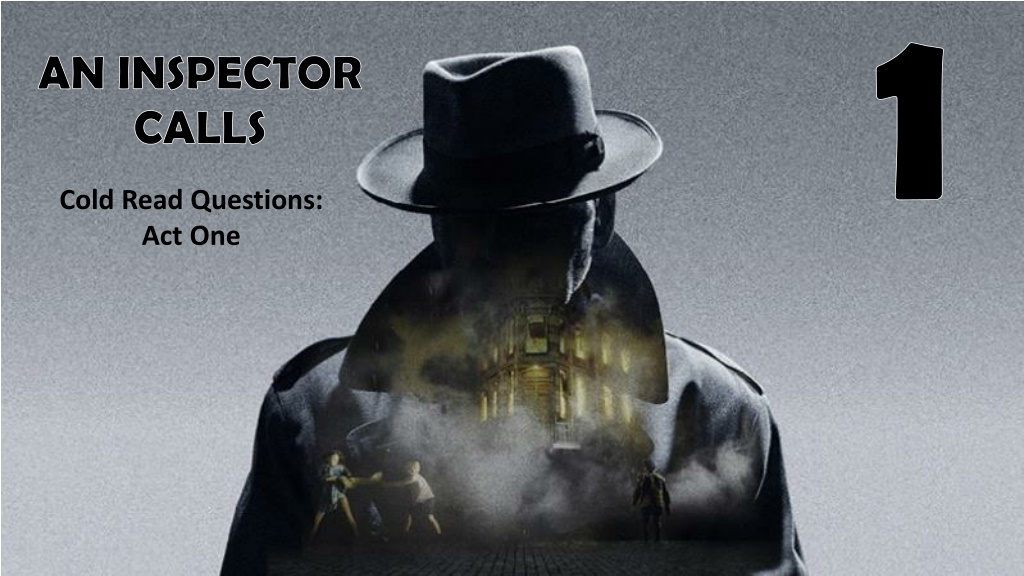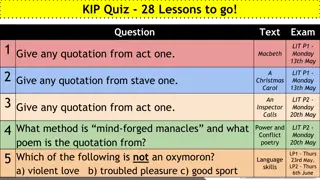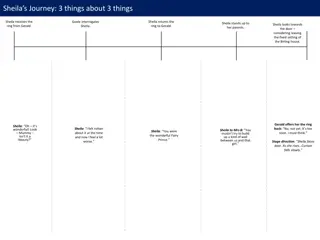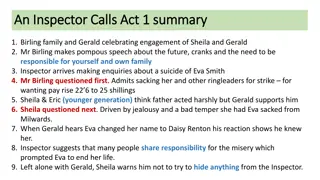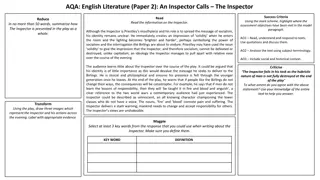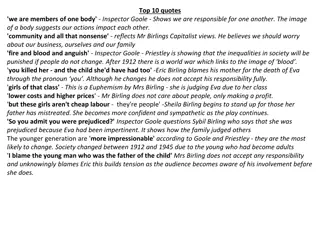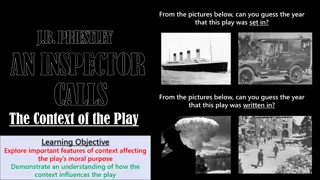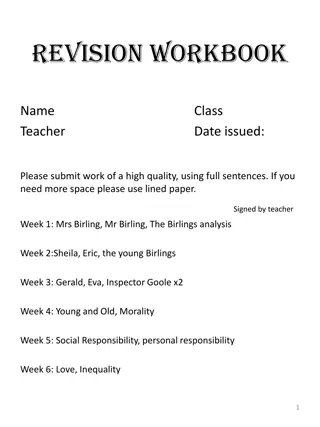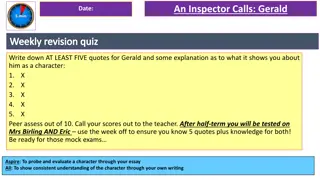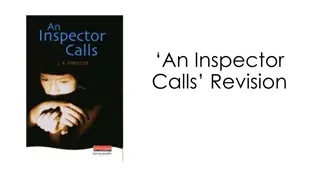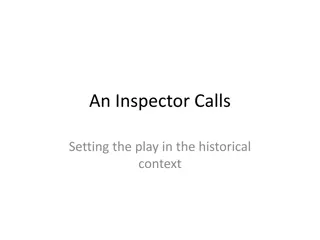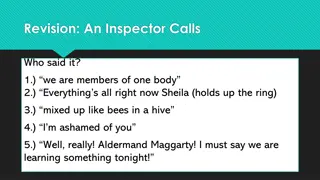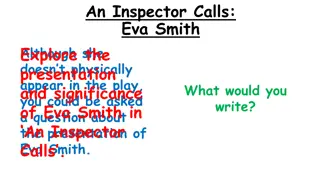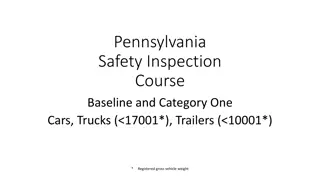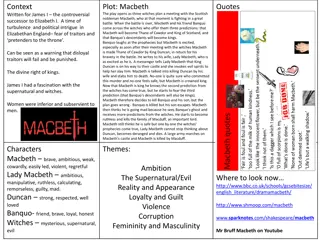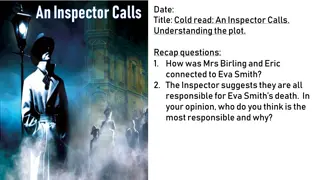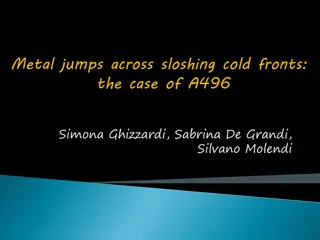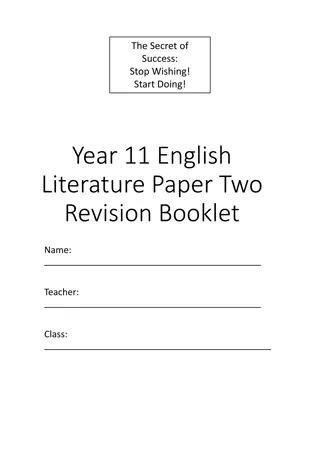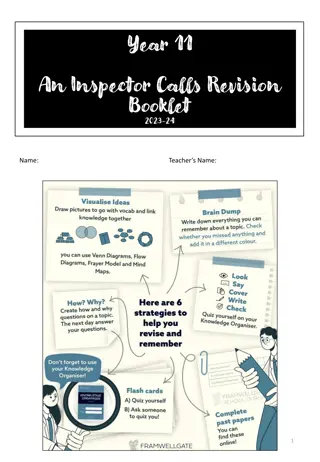An Inspector Calls Cold Read Questions: Act One
Explore Act One of "An Inspector Calls" through cold read questions that delve into character impressions, family dynamics, social class themes, and pivotal moments in the play. Get insights into the Birling family, Gerald, Sheila, Mr. Birling, Mrs. Birling, and the mysterious Inspector, unraveling their personalities, relationships, and reactions to critical events. Dive into deeper analysis by examining dialogue, stage directions, and the unfolding drama that sets the stage for the thought-provoking narrative ahead.
Download Presentation

Please find below an Image/Link to download the presentation.
The content on the website is provided AS IS for your information and personal use only. It may not be sold, licensed, or shared on other websites without obtaining consent from the author. Download presentation by click this link. If you encounter any issues during the download, it is possible that the publisher has removed the file from their server.
E N D
Presentation Transcript
AN INSPECTOR CALLS Cold Read Questions: Act One
READ THE PLAY Read the opening stage directions. 1. What are our first impressions of the Birling family based on their descriptions in the stage directions? 2. What is our first impression of Gerald based on his description in the stage directions? Gerald: An attractive chap about thirty, rather too manly to be a dandy but very much the easy well-bred young man-about-town . Mr Birling: A heavy-looking, rather portentous man in his middle fifties with fairly easy manners but rather provincial in his speech. 3. What are the Birlings doing when the play opens? Mrs Birling: about fifty, a rather cold woman and her husband s social superior. Eric: in his early twenties, not quite at ease, half shy, half assertive. Sheila: a pretty girl in her early twenties, very pleased with life and rather excited.
READ THE PLAY Read from Giving us the port, Edna to Actually I was listening. 4. Considering that we know Mrs Birling is her husband s socialsuperior , explain why she tells him off when he expresses intentions to congratulate the cook on their dinner. 9. I only mentioned it in passing Is this true? 10. Look Mummy isn t it a beauty? How could we sum up Sheila in three words? 11. Idon t often make speeches at you Do you think this is true? What impression are we getting of Mr. Birling after only a short time? 5. You ll have to get used to that, just as I had What is Mrs Birling saying is the role of women? What is she expecting Sheila to do? 6. What is the relationship like between Sheila and her brother Eric? How can we tell? 7. What are the Birlings celebrating? 8. What does Mr. Birling seem to be more excited about?
READ THE PLAY Read from Actually I was listening to We hear the sharp ring of a front door bell 12. You ll be marrying at a very good time The year is 1912. What will happen in a few years time and beyond? 16. She feels you might have done better for yourself socially What is the real reason for Gerald sparents absence? 13. We re in for a time of steadily increasing prosperity What does the term prosperity mean? Why is Birling wrong? 17. A man has to make his own way Consider the pronouns used in Birling s speech. What can we infer about his character and the world he lives in? 14. Consider what Birling says about war, the Titanic and Russia. What are the errors he has made? 18. Birling is sharing his world philosophy when the doorbell rings. Why do you think Priestley has the doorbell ring at exactly that point? 15. Birling is a capitalist. Priestley is a socialist. Why does Priestley have Birling say all of these things which aren t true?
READ THE PLAY Read from We hear the sharp ring of a front door bell to No, she didn t exactly go on the streets. 19. Consider the Inspector s description in the stage directions. What can we infer about him from the language Priestley uses to describe him? 23. Obviously it has nothing to do with the wretched girl ssuicide Consider how Birling describes Eva. Does he care? Why? Why not? 24. How did Eva fall foul of Mr Birling when she was alive? Why would Mr. Birling not like what Eva was asking for? 20. Why does the Inspector visit the Birling household? What has happened? 21. What is Birling s reaction when he hears the name EvaSmith ? Why do you think he would react in this way? 25. Explain how Birling is trying to threaten the Inspector by mentioning Colonel Roberts. 22. What is Eva s link to Mr. Birling? How did they know each other?
READ THE PLAY Read from No, she didn t exactly go on the streets to It s too late. She s dead. 30. How does Eva Smith unintentionally fall foul of Sheila in Milwards? 26. What is Sheila s initial reaction when she hears about Eva Smith s suicide? 31. What does Sheila s reaction to what the Inspector has said tell us about her character? 27. Why do you think Sheila asks if Eva Smith is pretty ? Would her death mean less if she wasn t pretty? 32. How is Sheila different to her father, Mr. Birling? 28. But these girls aren t cheap labour they repeople What is Sheila beginning to understand that Birling hasn t? 29. And then she got into trouble there, I suppose? What kind of character is Birling proving himself to be? Why is Priestley making him so unlikeable?
READ THE PLAY Read from It s too late. She s dead to the end of Act One. 33. How does Gerald when he hears the Inspector mention the name DaisyRenton ? 34. What do Sheila and Gerald discuss when the Inspector leaves the room? 35. Why you fool he knows. Of course he knows. What has Sheila realised about the Inspector that the others have not? Which character has changed the most in Act One? Which character has changed the least? What has the audience learnt about the Birlings in the short amount of time that has passed?
AN INSPECTOR CALLS Cold Read Questions: Act Two
READ THE PLAY Read from the beginning of Act Two to You needn t give me any rope. 1. How have Birling and Gerald treated Eva in the play so far? Why does Gerald try to dismiss Sheila s behaviour as a result of an exciting and tiring day ? 5. Mrs Birling speaks to the Inspector grandly . What impression do we get of her? 6. Mrs Birling is unaware that Eric has been drinking. Earlier in the play, she questioned where Sheila picked up the expression, squiffy . What kind of mother is she? 2. The Inspector massively takes charge What kind of character is the Inspector? 7. Youneedn t give me any rope. What does the Inspector mean? 3. Sheila feels this at once How is Sheila becoming a more perceptive person? 4. We often do on the young ones. They re more impressionable What is the Inspector saying about the younger generation in society? Is being impressionable a good or bad thing?
READ THE PLAY Read from You needn t give me any rope to She hand him the ring . 8. It s a favourite haunt of women in the town Should Gerald really be seen in the stalls bar at the Palace Variety Theatre? 12. Even if Gerald was not engaged to Sheila, would he have been able to keep seeing Daisy? 13. Even though Gerald ends the affair, his time with Daisy did bring her some happiness. Do you think we, as an audience, should be more sympathetic to Gerald or does he deserve our criticism as much as the Birlings? 9. Consider how Gerald meets Eva (now known as Daisy). What is your opinion on Gerald s intentions? 10. Ididn t ask for anything in return Do you think Gerald took advantage of Daisy? 14. She hands him the ring Turn back to page 5 where Sheila says, I ll never let it go out of my sight for an instant. What is the significance of Sheila handing back the ring? What does this moment symbolise? 11. I protest against the way in which my daughter, a young unmarried girl, is being dragged into this Birling still tries to protect his daughter because she is young and unmarried . What does this tell us about society in Edwardian Britain?
READ THE PLAY Read from She hands him the ring to the end of Act Two. 15. You and I aren t the same people who sat down to dinner here. How have Sheila and Gerald changed? 19. Why does Mrs. Birling shun her responsibility? Who does she say should look be responsible for looking after Eva at this point? 16. responsibilities as well as privileges. What is Priestley s message here? What is the role of the Inspector? Public men, Mr Birling, have 20. What does Mrs Birling say should happen to the baby s father? Why? 21. Now that Eric has been revealed as the father of Eva s baby, explain how Mrs Birling has condemned her son to punishment. 17. How does Mrs Birling know Eva Smith? How does Eva Smith fall foul of Mrs Birling? unknowingly 18. How does Mrs. Birling act when the Inspector is interrogating her? What does this tell us about her character?
AN INSPECTOR CALLS Cold Read Questions: Act Three
READ THE PLAY Read from the beginning of Act Three to fire, blood and anguish. Good night. 1. Why do you think Priestley has the Inspector interrogate Eric out of sequences? 6. How does Eric react when he finds out Mrs Birling condemned Eva and her baby to death? 2. Why do the older Birlings tell Sheila that they can t understand her attitude? Why are they refusing to admit they have done wrong? 7. Wedon t live alone. We are members of one body. We are responsible for each other. What is Priestley s message to the Birlings and to his audience? 3. How did Eric and Eva first meet? Discuss the events that occur between the two. 8. If men will not learn that lesson, then they will be taught it in fire and blood and anguish. What could this be an allusion to? 4. I was in that state when a chap easily turns nasty What happens between Eric and Eva? 5. You re not the kind of father a chap could go to when he s in trouble What is the relationship like between Birling and his son, Eric?
READ THE PLAY Read from fire, blood and anguish. Good night to I don t give a damn now 9. How do the older Birlings act when the Inspector leaves? Why does this distress Sheila? 14. I suppose we re all nice people now. How do each of the Birlings act when they find out the Inspector wasn t real? 15. You re beginning to pretend now that nothing s really happened at all. Why is it important that the Birlings doubt whether the Inspector is real? What does it allow the audience to test? 10. Why do the older Birlings dismiss Sheila s concerns as childish ? 11. Why do the Birlings begin to express doubt that the Inspector was a real person? 16. The Birling family is split and two sides have emerged. What are the two sides and who is on what side? 12. You allowed yourselves to be bluffed. Yes, bluffed. How do you think Birling delivers this line? Why? 13. Who appears at the front door and what news is brought to the Birlings?
READ THE PLAY Read from I don t give a damn now to the end of the play. 17. What proof does Gerald have that the Inspector isn t real? 22. The telephone rings sharply What is your response to the end of the play? What do you think has happened? Why does Priestley end the play the way he does? 18. How do the older Birlings react when Gerald reveals that no one called Eva Smith was brought into the infirmary? 19. How do the younger Birlings react in relation to this? 20. It frightens me the way you talk Why are Sheila and Eric, the younger generation, the ones to keep voicing the Inspector s message? 21. What about this ring? Why does Gerald try and give the ring back? What does this tell us about him?
